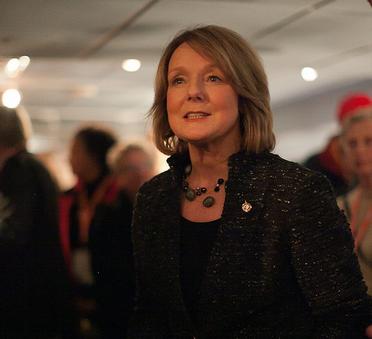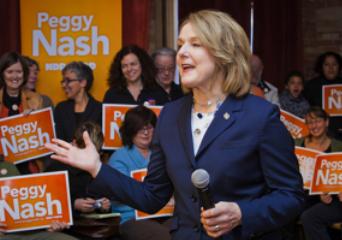
Peggy Nash wants to support gays and lesbians in developing countries.
As Canada’s NDP leadership race heats up, Peggy Nash has brought her queer-positive politics to the forefront of the race. On Dec 11, Nash was the first of the candidates running to succeed Jack Layton to release a series of lesbian, gay, bisexual and trans priorities.
The MP for Parkdale-High Park and former labour negotiator spoke with Xtra’s Katie Toth about youth, anti-gay bullying, immigration law and the shifting economy.
Katie Toth: Do you want to start by telling people who don’t know what your queer mandate is and a couple points of action you have?
Peggy Nash: Yeah, it’s a policy I put out in my leadership campaign in December. One of my endorsers is Randall Garrison, who is our LGBT critic for the NDP. He worked with us on this policy.
Basically, what we’re advocating is the implementation of our Trans Bill of Rights, which is something we’ve been working on for a number of years . . . a commitment to restore long-term funding and adequate funding to the Public Health Agency of Canada for HIV, AIDS and [hep C] epidemics. To advocate for LGBT rights internationally. We’ve seen some horrible examples of people condemned to death by laws which are overtly discriminatory because people are queer. And supporting provincial and community anti-bullying intiatives and very specifically working to end homophobic bullying.
So what sort of action did you want to take against bullying in schools on the federal level?
The federal government doesn’t have the ability to force schools to implement a measure like this, but what we can do federally is to work with the provinces, to encourage them to specifically include homophobic bullying measures in their mandate.
So far you’re the only leadership candidate for the NDP who’s put out a specifically queer-positive mandate. I was wondering why you think the other candidates haven’t done that yet.
I don’t know, and I haven’t kept up with what every other candidate is doing. I guess for me, working around equality issues and specifically working to end homophobia has been a priority. I’m a big supporter of Egale.
You mentioned that you would push again for Bill C-389, which would put gender identity and expression into the Canadian Charter of Rights and Freedoms. How would you approach that differently than past critics? Why do you think that this time, with your leadership, this issue could move forward in a way it hasn’t before?
Well, I think it can move forward under my leadership because I intend to form the next government of Canada. And under my government, we’ll make sure that the human rights are protected.
What makes your candidacy more likely to appeal to the broader populace?
What I’m doing is placing economic issues at the heart of my campaign. We’ve seen growing inequality in our country, economic inequality . . . We’ve got a level of economic inequality we haven’t seen since the 1920s.
This government is failing Canadians. We’re abandoning our environmental commitments and taking Canada backwards by building prisons for crimes that don’t exist and buying military hardware for wars that don’t exist.
I believe firmly that we have an opportunity now to present a real alternative to Stephen Harper and to truly represent the values of Canadians, which are progressive values.
You mentioned you are hoping to restore funding for the Public Health Agency of Canada for HIV and AIDS issues, and I was wondering how much of that money you would restore and where that funding would come from.
Well it’s money that ought to come from our tax dollars. And it’s money that is determined by the need. And the funds that are needed, we need to find it.
The reason I’m not giving you a specific number is that need may vary over time. If we’re talking about a health promotion necessity, then we need to listen to the public health professionals and not try and nickel and dime them so we’re underfunding or making our promotional organizations insecure. That’s why multi-year funding is important, so that people that work in these important facilities aren’t spending half of their time writing fundraising applications, but that they have the necessary resources to do their work.
You mentioned you’d like to see Canada playing more of an advocate role in terms of international queer rights. How, for you, would the distinction be made between being an advocate and . . .
A busybody?
Yeah, basically. Or . . . being colonialist.
Well, I don’t think we can stand by. I mean, we have the situation in Uganda where people would be sentenced to the death penalty simply for being queer. I think that we have an obligation to speak out when there are situations that are simply unacceptable. I don’t believe in subsidizing our economic relationships with disregard for human rights, disregard for the environment or disregard for labour rights.
It doesn’t mean we can control what other countries do. But international public opinion does play a role. We’ve seen it time and time again, whether it’s public outcry leading to someone not being executed or not being stoned or some kind of really reprehensible treatment.
Would you take that same kind of hard line with representatives of the United States if they engaged in similar human rights abuses?
Well, I would say that we still have an obligation to speak out and to let our opinions be known. The United States is our biggest trading partner, and I think in order to have a good relationship, we need to make sure that we’re communicating fully on a wide range of issues, including human rights issues.
You seem to be getting a lot of attention from youth members of the party. I was wondering what you thought it was about your platform in particular that was drawing in young people.
I guess I’m someone who likes to challenge people. We’ve got to use our energy to work together to build our country. We’ve got this incredible opportunity right now to really improve our country to make things better, to build the kind of country we’ve always wanted to see.
For example, in British Columbia, we have an amazing young team of activists. They’re just full of ideas and energy, and I know that they’re going to change this country.


 Why you can trust Xtra
Why you can trust Xtra


